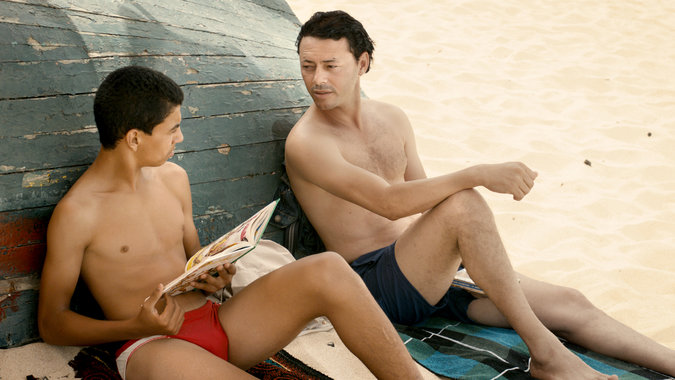
For a film rooted in a personal story, “Salvation Army” feels awfully remote. This disjointed movie is the directorial debut of the Moroccan author Abdellah Taïa, who caused a stir when he came out in his country, where homosexuality is illegal. Mr. Taïa adapted the screenplay from his autobiographical novel of the same name.
Part of a large family, the young Abdellah (Said Mrini) leads a quiet, private life. We watch as older men exploit him for trysts. Abdellah’s family may know of his sexual orientation: His father (Abdelhak Swilah) catches him chanting, “He loves me, he loves me not” and barely bats an eye. Abdellah is drawn to his strapping older brother, Slimane (Amine Ennaji), who intervenes when their father beats their mother (Malika El Hamaoui).
After a seaside trip, during which Slimane and Abdellah debate whether they should speak French (“the language of the rich,” Abdellah says), the movie jumps forward 10 years. By then, Abdellah (Karim Ait M’Hand) is involved with a Swiss academic (Frédéric Landenberg).
The narrative hints at a critique of mutual exploitation by Europeans and Africans, but those ideas are never explored. Mr. Taïa has written of his upbringing in a New York Times Op-Ed article that was far more vivid than anything in the film, which is hampered by unnecessary vagueness and drab composition. The cinematographer is Agnès Godard, whose collaborations with the director Claire Denis do wonders with light and gesture, tools that Mr. Taïa’s film doesn’t put to good use
FRENCH VERSION
Partie d’une famille nombreuse, le jeune Abdellah (dit Mrini)mène une vie tranquille et privée. Nous observons que leshommes plus âgés lui exploitent pour les rendez-vous galants.Famille abdellah connaissent peut-être son orientation sexuelle :son père (Abdelhak Swilah) intercepte lui chantant, « il m’aime, ilne me n’aime pas » et les chauves-souris à peine un œil.Abdellah est attirée sur son frère aîné cerclage, Slimane (AmineEnnaji), qui intervient lorsque leur père bat sa mère (Malika ElHamaoui).
Après un voyage de bord de mer, au cours de laquelle Slimane etAbdellah débattent si ils doivent parler Français (« la langue desriches », Abdellah dit), le film saute sur dix années. D’ici là,Abdellah (Karim Aït M’Hand) participe avec un universitaire suisse(Frédéric Landenberg).
Les astuces narratives à une critique de l’exploitation mutuellepar les européens et africains, mais ces idées ne sont jamaisexplorés. M. Taïa a écrit de son éducation dans un article du NewYork Times Op-Ed qui a été beaucoup plus vive que quoi que ce soit dans le film, qui est entravé par l’imprécision inutile etcomposition terne. Le directeur de la photographie est AgnèsGodard, dont des collaborations avec le réalisateur Claire Denisfaire des merveilles avec la lumière et le geste, les outils que lefilm de M. Taïa n’est pas utilisé à bon escient.


